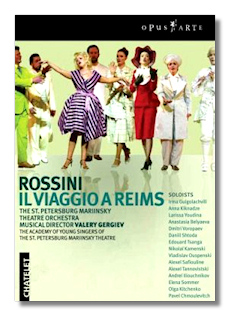
The Internet's Premier Classical Music Source
Related Links
- Rossini Reviews
- Latest Reviews
- More Reviews
-
By Composer
-
Collections
DVD & Blu-ray
Books
Concert Reviews
Articles/Interviews
Software
Audio
Search Amazon
Recommended Links
Site News
 DVD Review
DVD Review
Gioachino Rossini

Il Viaggio a Reims
- Anastasia Belyaeva (Madame Cortese)
- Vladislav Ouspenski (Baron von Trombonok)
- Larissa Youdina (Countess di Folleville)
- Daniil Shtoda (Count Libenskof)
- Anna Kiknadze (Marquise Melibea)
- Alexeï Safiouline (Don Alvaro)
- Irma Guigolachvili (Corinna)
- Dmitri Voropaev (Belfiore)
- Olga Kitchenko (Modestina)
- Edouard Tsanga (Lord Sidney)
- Nikolaï Kamenski (Don Profondo)
- Elena Sommer (Maddalena)
- Alexeï Tannovistski (Don Prudenzio)
- Andreï Iliouchnikov (Don Luigino)
- Pavel Chmoulevitch (Antonio)
Chorus and Orchestra of the Mariinsky Theatre/Valery Gergiev
Opus Arte DVD OA0967D 137min DTS LPCM Stereo Anamorphic Widescreen
Rossini penned Il Viaggio a Reims (The Voyage to Reims) in 1825 for a very specific occasion: the coronation of France's King Charles X. (That unlucky ruler was forced to abdicate five years later, however.) The composer never intended this work, the last of his Italian operas, to be more than an occasional piece, and he reused about half of it in Le Comte d'Ory. Nevertheless, it was revived in the 1984 by Claudio Abbado, who recorded it twice – once for Deutsche Grammophon and again for Sony Classical. There have been other revivals too. The Kirov Opera performed it in Washington, D.C. in 2007, and this DVD preserves another Russian production that went west: the Mariinsky Theatre in Paris (the Théâtre du Châtelet, to be exact). Three performances from December 2005 were used to create this DVD.
The plot, such as it is, concerns travelers from several nations who are on their way to see the coronation in Reims. For the moment, they are staying at a Tyrolean spa run by the aptly named Madame Cortese. There are flirtations and temporary falling-outs, none of them of great importance. The Contessa di Folleville, a fashionable Frenchwoman, loses most of her elegant clothes early in the opera when a coach overturns. And so it goes. About two-thirds of the way through this long one-acter, it is announced that no horses are left to take the guests to Reims. Disaster! Fortunately, a letter arrives stating that there will be coronation celebrations in Paris, so the Contessa di Folleville invites everyone to go there with her, as Paris is her home. The opera ends with several of the characters performing a number characteristic of their country. (The Englishman, Lord Sidney, shyly sings "God Save the King.") Giving the lie to the opera's title, no one makes it to Reims!
Probably the biggest weakness of Il Viaggio a Reims is that it is more a variety show than an opera. This production, directed by Alain Maratrat, makes a strength of that weakness by ensuring that the fun never stops. The orchestra, dressed in summer whites, is on the rear of the stage itself, and a runway has been extended in front of the stage to allow the cast members to go into the audience and even interact with its members. The costuming is in so many styles that it is impossible to tell if the opera is taking place in the present or in the past. Despite the coach accident, the Contessa has two wild ensembles to wear (the second seems to have been inspired by fried eggs). The classical poetess Corinna enters in an indescribable creation, something like a mound of whipped cream or feathers, that is lighted from within. She wears a smaller version of the same on her head. On the other hand, Modestina, the Contessa's maidservant, spends the entire opera in pink pajamas and holding an equally pink teddy bear. Whatever!
Although it is empty-headed, this is a happy, happy show. I usually dislike it when the cameras cut to audience members to show how much fun they are having. Here, it works, probably because everyone seems genuinely enraptured by the visual display as well as by the music (which isn't even top-drawer Rossini, for the most part).
The singers from the Mariinsky Theatre cannot reach the level established by Abbado in his performances of this work. Still, this is a very acceptably sung production; the problem is that Rossini stylists do not grow on trees, and some members of the cast betray various degrees of discomfort with the idiom. In spite of that, there are some outstanding singers here. To my ears, best of all is tenor Daniil Shtoda as the Russian (!) Count Libenskof. His is a voice with both style, grace, and power, and I look forward to hearing him in more Rossini, Donizetti, and early Verdi. Another tenor, Dmitri Voropaev, shows that he has the real stuff as Belfiore. Among the women, the stand-outs are Anastasia Belyaeva as Madame Cortese, Larissa Youdina as the Contessa, and Anna Kiknadze as the Marchesa Melibea. The chorus, all young members of the Mariinsky, is a delight to hear and see. Gergiev keeps the music perking along, although not with the lightness that Abbado brought to it.
Sonically and visually, production values are excellent. The camera-work is agile and brings viewers wherever the action is. The English subtitles are good too.
It used to be said that all Il Trovatore requires is four of the greatest singers in the world. Il Viaggio a Reims ups that number to 14. The Mariinsky can't quite fill the bill, but, given the gameness of these singers and the wittiness of this production, it comes close enough to make this DVD a gladdening success.
Copyright © 2007, Raymond Tuttle




















